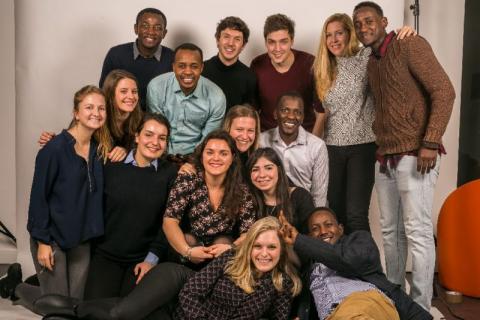Wintegreat is a student organisation that aims to integrate refugees and empower them to achieve their full potential. My university, HEC Paris, has partnered with this organisation to deliver a programme which, as well as intensive language courses, pairs participants with students and alumni.
As of today, the Wintegreat project – which started out as the initiative of two motivated and proactive ESCP Europe Business School students – is present in nine higher education institutions across France.
As I walked into the first meet and greet session of the semester, I was struck by the overwhelming positivity and openness of a group of individuals who had recently been forced to leave friends and family behind. Back in my dormitory, I thought back with an entirely new perspective on my own, admittedly incomparable, experience as a teenager.
Shortly after moving with my mother from northern Germany to southern France, I joined an all-French middle school. At the beginning, in part due to shyness, it was impossible for me to communicate with my peers and ask for directions on the street, let alone buy myself some candy. An intense feeling of isolation led me to spend a great amount of my free time calling or writing letters “back home”. Little by little, encouraged by my teachers and classmates, but also by necessity, I gradually adapted to the foreign language and culture. After a few months in my new middle school, I felt completely integrated.
Individuals who experience a similar change of environment under considerably less favourable circumstances, and with less external support, have significantly higher barriers to overcome. In the current European socio-political environment, many refugees still fall into this category. As they are trying to leave behind some of the most challenging situations of their lives, they are often the subject of isolation and, in many unfortunate cases, repeated discrimination.
From a waiter working in Singapore to becoming a Harvard graduate
I discovered Wintegreat on the HEC Paris campus, in the midst of the European refugee crisis. I felt a real urge to help the situation, if only on a local level. A short interview with Eymeric Guinet, one of the two founders, made me eager to help accompany a new group of participants on their path towards overcoming linguistic, institutional and cultural barriers.
Over the course of the past semester, Wintegreat volunteers accompanied a group of 20 refugees on the HEC Paris campus. These volunteers of students and alumni often went beyond what was expected of them by organising cultural visits, drinks and dinners, and even orchestrating a crowdfunding campaign to finance the academic aspirations of one of our participants.
Many of our teachers organised interactive sessions and groups for the refugees to partake in. Gilles Stoltz, my first year statistics professor, took it upon himself to teach – in his free time – a session centred around traditional French family values and stereotypes.
Although we had a small team on campus, the support we received not only from HEC Paris. Indeed, more than two-thirds of our participants have found a job or have started a new degree, while hopefully forging long-lasting memories and relationships on the way.
Whenever I tell people about my first few months living in France, Italy or Mexico, I often encounter praise. Indeed, time spent living abroad is usually highly regarded. Yet many times, refugees in Europe are not judged according to the same standards.
The participants I encountered over the past semester were highly driven individuals, with unique sets of experiences and skills. Given the necessary support and guidance, they will undoubtedly enrich our societies and economies over years to come. More broadly, I believe that unfortunately a lot of refugees are still not given the chance to fully live up to their potential. Motivated high school and university students, as the ones who helped create and establish the Wintegreat programme, have a substantial role to play.

Comments